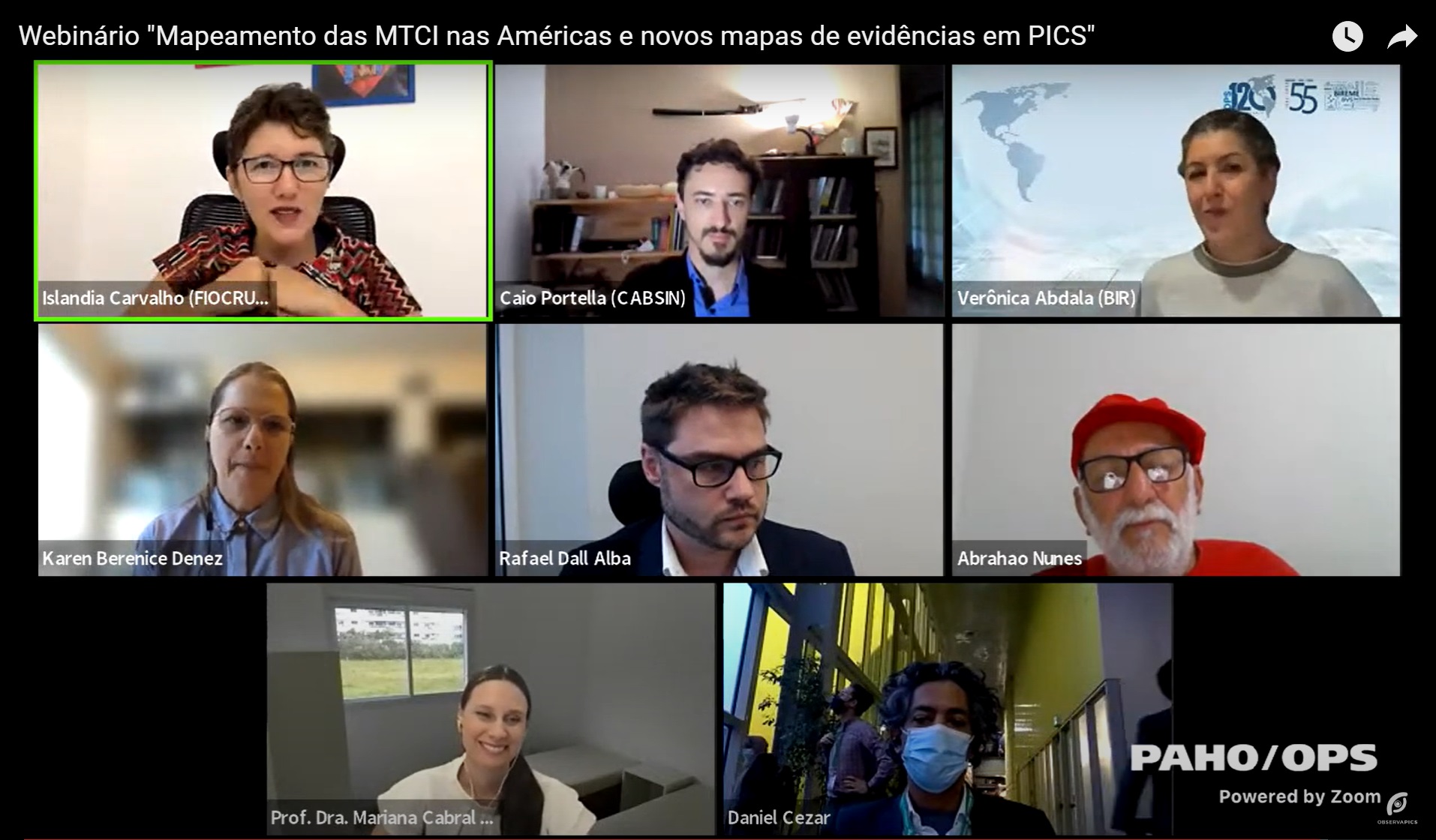Following WHO guidelines in its strategy for Traditional, Complementary and Integrative Medicine (TCIM), PAHO/WHO Brazil, in partnership with BIREME, held a webinar on the last December 13th to publicize two important initiatives that contribute to the strengthening and integration of TCIM into health systems and services in the Americas and the Caribbean, and to increase the resolution and sustainability of national health systems.
At the opening of the webinar, Roberto Tápia, coordinator of the Health Services and Systems area at PAHO/WHO Brazil, emphasized the commitment to work very closely with the TCIM, seeking ways to integrate the way people see health from the perspective of their traditional knowledge. In turn, João Paulo Souza, director of BIREME, highlighted the importance of celebrating and recognizing the work of the entire Network to promote comprehensive care for the health needs of the population. Solutions such as the TCIM Americas VHL, which seeks to make visible and provide access to evidence, are a concrete way of putting this synthesized and organized knowledge into motion in the direction of actions.
The webinar also had the participation of project partners and actions promoted by PAHO/WHO Brazil for the construction and implementation of a strategic plan for TCIM, such as: Brazilian Academic Consortium of Integrative Health (CABSIN), FIOVCRUZ Vice-Presidency of Environment, Health Care and Health Promotion, TCIM Americas Network, Brazil’s Ministry of Health, National Health Council (CNS) and PICS Network (RedePICS).
The main objective of the webinar was to present data from the first phase of the Mapping of Traditional Complementary and Integrative Medicines project, and to launch new Evidence Maps on the clinical effectiveness of PICS.
 The Mapping of Complementary and Integrative Traditional Medicines in the Americas project is coordinated by the National Observatory of Integrative and Complementary Health Knowledge and Practices (ObservaPICS/Fiocruz) in partnership with PAHO/WHO Brazil that collaborates with the construction of an updated panorama on the integration of TCIM in the health systems of 36 countries. Mapping seeks to characterize the implementation of TCIM care in health systems and services and to correlate demographic, epidemiological and economic information in each country. The collection of information began in 2021 through documentary research on government websites, interviews with strategic actors and/or TCIM experts.
The Mapping of Complementary and Integrative Traditional Medicines in the Americas project is coordinated by the National Observatory of Integrative and Complementary Health Knowledge and Practices (ObservaPICS/Fiocruz) in partnership with PAHO/WHO Brazil that collaborates with the construction of an updated panorama on the integration of TCIM in the health systems of 36 countries. Mapping seeks to characterize the implementation of TCIM care in health systems and services and to correlate demographic, epidemiological and economic information in each country. The collection of information began in 2021 through documentary research on government websites, interviews with strategic actors and/or TCIM experts.
At the webinar data was presented from the first phase of the Mapping and, according to the preliminary report, 13 of the 36 countries surveyed (Mexico, Guatemala, Nicaragua, Argentina, Bolivia, Brazil, Chile, Colombia, Ecuador, Paraguay, Peru, Venezuela, and Cuba) have regulations for both complementary and integrative medicine (CIM) and traditional medicine (TM). In El Salvador and Panama there is only for TM and in Uruguay, only CIM. Regarding traditional medicines of indigenous peoples, 15 countries have some normative instrument. “The report provides a descriptive analysis. From there we are having some discussions. For example, whether the implementation of TCIM is related to health expenses”, explained the coordinator of ObservaPICS and researcher at Fiocruz Pernambuco, Islândia Carvalho.
The Report is open for consultation and contributions by managers, professionals and users of Integrative and Complementary Health Practices (PICS) and TCIM in the Americas and the Caribbean.
The Evidence Maps on the clinical effectiveness of PICS have been built since 2019 by the Brazilian Academic Consortium of Integrative Health (CABSIN) in partnership with BIREME and aim to contribute to the strengthening of the Unified Health System (SUS) in Brazil through the Policy National Institute of Integrative and Complementary Practices in the SUS (PNPIC). In the webinar, nine maps were released that show the clinical effectiveness of PICS in the treatment of chronic pain, uterine cancer, and cardiovascular diseases, as well as clinical evidence of moxibustion, cupping therapy, aromatherapy, apitherapy, homeopathy, and Brazilian medicinal plants.
 The main findings of the new maps were presented by Caio Portella and Mariana Cabral, board members of CABSIN, and highlight the clinical evidence of PICS evaluated by hundreds of systematic review studies applied to various groups of health outcomes such as cancer, pain, health mental health, oral health, and women’s health, among others.
The main findings of the new maps were presented by Caio Portella and Mariana Cabral, board members of CABSIN, and highlight the clinical evidence of PICS evaluated by hundreds of systematic review studies applied to various groups of health outcomes such as cancer, pain, health mental health, oral health, and women’s health, among others.
Verônica Abdala, from BIREME, highlighted the importance of Evidence Maps for promoting access and use of scientific evidence in the area of TCIM and PICS and their application in health decisions and policies. The maps fulfill the function of mapping, gathering and characterizing the available clinical evidence and graphically presenting interventions with PICS for different groups of health outcomes. All maps can be accessed at this link.
The Webinar held on December 13th was promoted by the PAHO/WHO Office in Brazil, with the collaboration of BIREME, and was transmitted via Zoom and the ObservaPICS YouTube Channel. The webinar recording is available on YouTube.
Related articles
DeCS/MeSH has TCIM as a new thematic category. BIREME Bulletin n° 66. Available from: https://boletin.bireme.org/en/2022/03/26/decs-mesh-has-mtci-as-a-new-thematic-category/
PAHO/WHO signs cooperation agreement with the United States Academy of Integrative Health and Medicine. BIREME Bulletin n° 60. Available from: https://boletin.bireme.org/en/2021/10/04/paho-who-signs-cooperation-agreement-with-the-united-states-academy-of-integrative-health-and-medicine/
BIREME present at the II World Summit on Traditional Complementary Medicine: Towards an Integrative Medicine. BIREME Bulletin n° 58. Available from: https://boletin.bireme.org/en/2021/08/01/bireme-present-at-the-ii-world-summit-on-traditional-complementary-medicine-towards-an-integrative-medicine/